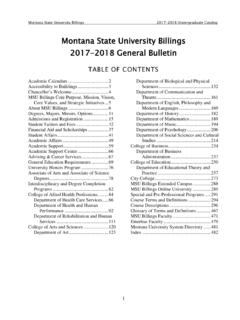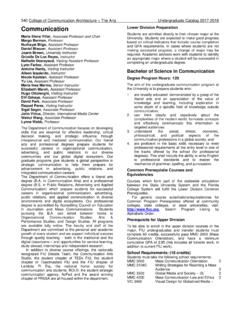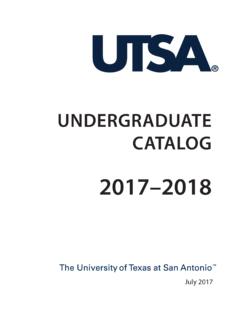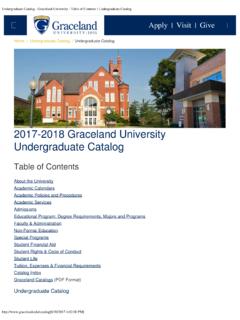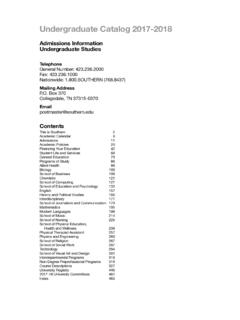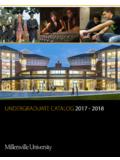Transcription of UNDERGRADUATE CATALOG 2017 2018 - bsu.edu
1 UNDERGRADUATE CATALOG 2017 2018 This CATALOG is an informational guide to Ball State University. The information in this CATALOG is subject to change and should not be considered a contract. CATALOG changes are possible for a number of reasons, including changes in certification or licensing standards for certain programs of study, or because of periodic review of academic programs, curricula, and course offerings by the university governance system. The university, through its academic advising system, will make every effort to help students adapt to changes in the CATALOG . However, the final responsibility for meeting academic and graduation requirements rests with each student. Students are encouraged to consult frequently with their faculty or academic advisors and to remain in regular contact with major departments in order to stay informed about possible changes in this CATALOG .
2 Ball State University is an equal opportunity/affirmative action institution in accordance with civil rights legislation and does not discriminate on the basis of race, religion, national origin, sex, age, disability, Vietnam veteran status, or any other basis of discrimination prohibited by law in any of its educational programs, activities, admission, or employment policies. Concerns regarding this policy should be referred to the Director of Affirmative Action, Administration Building, Ball State University, Muncie, Indiana 47306, 765-285-5162. The Title IX Coordinator and the 504 Coordinator may be reached at the same CONTENTS 3 General Information 4 Admissions 9 Degree Requirements and Time Limit 15 Educational Opportunities and Student Services 18 Academic Programs (including certificates)
3 25 University Core Curriculum 32 Course Prefixes and Numbers 35 Interdepartmental Programs 47 Academy for Sustainability 49 African American Studies 50 Ancient Studies 50 Asian Studies 51 Energy 51 European Studies 52 International Studies 53 Legal Studies 54 Mathematical Economics 55 Medallion Scholar 55 Native American Studies 55 Peace Studies and Conflict Resolution 56 Real Estate Development 58 College of Architecture and Planning 59 Architecture 67 Construction Management and Interior Design 73 Landscape Architecture 76 Urban Planning 81 Miller College of Business 85 Accounting 87 Economics 93 Finance and Insurance 97 Information Systems and Operations Management 108 Management 117 Marketing 125 College of Communication, Information, and Media 125 Interdepartmental 125 Communication Studies 130 Journalism 142 Telecommunications 154 College of Fine Arts 154 Art 174 Music 195 Theatre and Dance 211 College of Health 211 Counseling Psychology, Social Psychology.
4 And Counseling 212 Kinesiology 229 Military Science 230 Nursing 236 Nutrition and Health Science 250 Social Work 253 Speech Pathology and Audiology 257 Honors College 260 College of Sciences and Humanities 260 Interdepartmental Programs 260 Science 263 Social Studies 263 Anthropology 270 Biology 282 Chemistry 287 Computer Science 292 Criminal Justice and Criminology 296 Economics 296 English 306 Geography 314 Geological Sciences 318 History 326 Mathematical Sciences 336 Modern Languages and Classics 350 Natural Resources and Environmental Management 358 Philosophy and Religious Studies 363 Physics and Astronomy 370 Political Science 377 Psychological Science 381 Sociology 384 Women s and Gender Studies 387 Teachers College 388 Interdepartmental Programs 389 Teacher Licensing 392 Educational Field Experiences 392 Educational Leadership 393 Educational Psychology 395 Educational Studies 401 Elementary Education 409 Family, Consumer, and Technology Education 419 Special Education 427 University Schools 427 Burris Laboratory School 427 Indiana Academy for Science, Mathematics, and Humanities 428 Accreditation 3 GENERAL INFORMATION HISTORY OF THE UNIVERSITY Ball State University was founded as Indiana State Normal School, Eastern Division, in 1918.
5 Its antecedents, all housed in what is now the Ball State Administration Building, were also normal schools, owned and operated under various names. In 1918, the Ball brothers, a prominent Muncie industrial family, bought the property and donated it to the state of Indiana, which, in turn, transferred control of the school to the board of trustees of the Indiana State Normal School in Terre Haute. In 1922, in recognition of the generosity of the Ball brothers, the board added Ball Teachers College to the school s name. In 1929, the Indiana General Assembly separated the two colleges, naming the Muncie campus Ball State Teachers College. On February 8, 1965, the general assembly renamed the institution Ball State University in recognition of its phenomenal growth in enrollment and physical facilities; the variety and quality of its educational programs and services; and in anticipation of the much broader role it would be expected to assume in the future.
6 DESCRIPTION OF THE UNIVERSITY Ball State University is a comprehensive, publicly assisted institution of higher learning whose mission is to provide excellent education. It is located in Muncie, Indiana, a city of 70,000, fifty-six miles northeast of Indianapolis. Although its primary concern is for the citizens of Indiana, it offers programs with appeal to regional, national, and international audiences. Ball State University offers a strong UNDERGRADUATE liberal and professional education and selected graduate programs of high quality. Ball State students can choose from a comprehensive range of academic programs at the associate, baccalaureate, and master s levels, as well as doctoral programs in areas where the university has special competence.
7 The university has a selective admissions policy; in some areas, such as architecture, the university is very selective. Exceptionally well-qualified UNDERGRADUATE students may enroll in the Honors College for more intellectually demanding programs of study. Students who have not decided on a major or who may need to strengthen their learning skills can take advantage of the special academic assistance and intensive educational advising offered by University College. As part of Ball State s commitment to excellence in education, the university offers students a friendly, collegial atmosphere; a full range of out-of-class activities; and excellent, well-planned academic, residential, and recreational facilities. An impressive array of student support services contributes to the personal, social, and intellectual development of all students.
8 Although Ball State University is primarily a residential academic community, it also supports programs that reach students well beyond the immediate campus. Through interactive telecommunications, Internet courses, and on-site courses, Ball State distance learning students are able to take courses and entire degree programs. The university has a strong commitment to cultural diversity and international programs. It offers exchange programs with universities throughout the world and a wide variety of opportunities for students to study abroad. VISION Ball State University will be a national model of excellence for challenging, learner-centered academic communities that advance knowledge and improve economic vitality and quality of life. MISSION 4 Ball State University is an innovative, supportive academic community that inspires students by: Offering action-oriented learning, including immersive out-of-class experiences, research, and study-abroad; Providing extraordinary access to and collaboration with professors who create scholarship to advance knowledge, improve teaching, and transform learning; and Engaging state, national, and international communities to enhance educational, economic, and cultural development.
9 THE BENEFICENCE PLEDGE Members of the Ball State University Community .. pledge to maintain high standards of scholarship and excellence To work with students, faculty, and staff to strengthen teaching and learning on campus. pledge to practice academic honesty To model and uphold academic integrity, to honor their peers and earn the trust and respect from all members of the community. pledge to act in a socially responsible way To treat each person in the Ball State community with civility, courtesy, compassion, and dignity; to respect the property and environment of the campus. pledge to value the intrinsic worth of every member of the community To respect and learn from differences in people, ideas, and opinions. ADMISSIONS By statute, the Ball State University Board of Trustees is authorized to prescribe the conditions for admission of students to the university, provided that graduation from a commissioned secondary school or its equivalent shall be required.
10 Specific admissions policies and practices are subject to change as the institution adjusts to enrollment patterns. In order to maintain high academic standards and to ensure that students receive the best education possible at Ball State, the university limits enrollment to students meeting specific admissions requirements. In addition, the university reserves the right to determine the semester to which students are admitted on the basis of students academic qualifications as well as availability of space. The university also reserves the right to limit the number of nonresident students. To be considered for admission to Ball State, a student must have graduated or be on track to graduate from an accredited secondary school or have earned a General Education Development (GED) and/or Test Assessing Secondary Completion (TASC) certificate.


